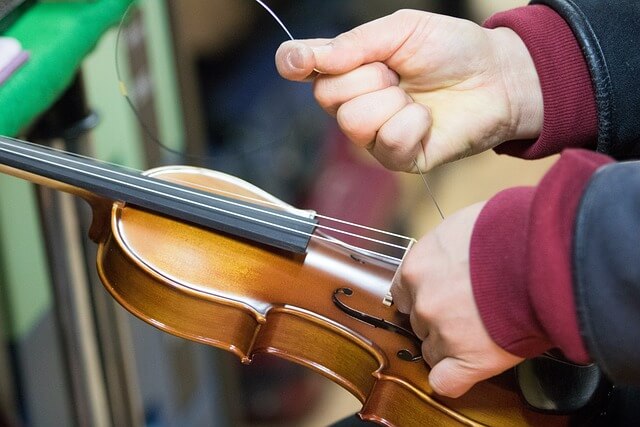Instrument Repair

Introduction to Instrument Repair Tools
Instrument repair requires a range of specialized tools to address the unique needs of each instrument type. Here’s a breakdown of essential tools for various repairs:
- Measuring Tools: Calipers and rulers for precision measurements.
- Hand Tools: Screwdrivers, pliers, and files for adjustments and fine work.
- Specialized Tools: Peg shapers (for stringed instruments), pad removers (for woodwinds), and mouthpiece pullers (for brass).
- Cleaning Equipment: Brushes, swabs, and polishers for maintenance.
- Soldering Kit: For repairing metal parts on brass instruments.
These tools ensure that repairs are precise, improving the instrument’s sound and functionality.
Can you earn money Repairing Instruments?
Are there any other professions/hobbies that could be leveraged for Instrument Repair?
Yes, several professions and hobbies can be leveraged for instrument repair:
- Woodworking: For crafting or repairing wooden parts of instruments, such as acoustic guitars or violins.
- Electronics: Useful for repairing electric guitars, amplifiers, or other electronic components in modern instruments.
- Metalworking: Important for fixing brass or woodwind instruments like trumpets or saxophones.
- Musical Knowledge: Understanding how instruments function is essential for accurate tuning and maintenance.
- Leatherworking: Helpful for drum repairs or making custom instrument cases.
These skills can greatly complement an instrument repair business.
Is it expensive to get started in Musical Instrument Repair?
Starting in musical instrument repair can vary in cost depending on the type of instruments you plan to work with. For basic string or woodwind repairs, expect an initial investment of around $500–$1,500 for essential tools like screwdrivers, clamps, specialized pliers, and reamers. Advanced repairs (e.g., brass instruments or electronics) may require additional tools, bringing the cost up to $2,000–$3,000.
Starting with a few key tools and expanding as you gain more experience is a practical approach to managing costs.
Essential Tools for Musical Instrument Repair
Musical instrument repair requires a diverse set of tools depending on the instruments and repairs involved. Here are some essential tools:
General Tools:
- Screwdrivers: Precision screwdrivers for adjusting or replacing small screws.
- Pliers: Needle-nose and parallel pliers for intricate handling.
- Files: For refining edges, key posts, and removing excess material.
- Tweezers: Useful for fine adjustments, particularly with small parts.
Specialized Tools:
- Pad and Spring Reamers: Used for adjusting woodwind instruments.
- Dent Removal Tools: For brass instruments like trumpets and trombones.
- Sanding Sticks/Files: For surface repairs on wood instruments.
Other Tools:
- Measuring Gauges: Ensure accurate repairs and alignment.
- Clamps: Secure parts during gluing or assembly.
These tools are fundamental for effective and accurate instrument repairs.
Are there any safety considerations with Musical Instrument Repair?
Yes, there are some safety considerations with musical instrument repair:
- Sharp Tools: Many tools, like knives, files, and screwdrivers, can cause cuts if mishandled. Always handle with care.
- Chemicals and Adhesives: Glues, solvents, and cleaning agents used for repairs may release harmful fumes or cause skin irritation. Use in well-ventilated areas and wear gloves when necessary.
- Eye Protection: Small parts or springs may snap during repair. Safety glasses can help protect your eyes from flying debris.
- Ergonomics: Repetitive motions can lead to strain. Use proper posture and take breaks to avoid injury.
Educational Resources for Musical Instrument Repair
Online Resources
- iFixit (Musical Instrument Repair Guides) – Provides detailed step-by-step guides for repairing various types of instruments. Visit iFixit
- Fixing Instruments (YouTube) – Video tutorials on repairing and maintaining different musical instruments. Visit Fixing Instruments
- Reddit – Instrument Repair – A community where instrument repair tips and tricks are shared. Visit Reddit
Are there Musical Instrument Repair communities or blogs that could be helpful?
- The Musical Instrument Makers Forum (MIMF) – An online community for discussions on building, repairing, and maintaining musical instruments. Visit MIMF
- The Luthier Community – Focused on stringed instrument repair, this forum offers detailed discussions and advice. Visit The Luthier Community
- Reddit – Instrument Repair – A subreddit where musicians and technicians share repair tips and techniques. Visit Reddit
- iFixit Musical Instrument Guides – Blogs and tutorials on instrument repair. Visit iFixit
Frequently Asked Questions (FAQ)
-
- Do I need formal training to repair instruments? While formal training helps, many repair skills can be self-taught through online resources, books, and practice.
- How long does it take to become proficient in instrument repair? It varies based on complexity and experience. Basic repairs can be learned within months, but advanced repairs may take years.
- Can I repair all types of instruments? Some specialize in certain instruments, like string or brass, while others repair a broader range.
- Is instrument repair expensive? Initial tool investment can be costly, but it’s manageable for basic repairs.
- Where can I learn instrument repair? Check out online resources, tutorials, and repair-focused communities like iFixit or MIMF.
Ad Notice:
ToolFinder is a site as a free service. We do not charge a fee, and so we have ads on our site to help support development cost and basic time input.
We may also have links on our site to others for products - known as affiliate links - you will Not pay more by utilizing these links, but the merchant would provide ToolFinder a fee for the referral. As an Amazon Associate I earn from qualifying purchases.

